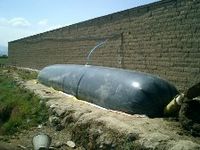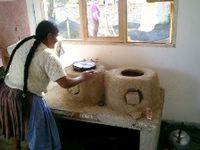Tecnologias En Desarrollo

Tecnologias En Desarrollo (the name literally means "Technologies in Development") promotes the development of appropriate technology in rural and urban fringe communities in Bolivia. Created in 2000 and based in Cochabamba, Bolivia’s third city, the NGO* also has close links to the Instituto de Astrofisica de Canarias in Tenerife from where much of the original research has been undertaken. It is currently working in 7 rural communities in the Cochabamba region as well as one in Pando, and there are plans to expand its work to the Mesothermic Valleys in Santa Cruz and Andean communities near La Paz and Oruro.
Tecnologias En Desarrollo undertakes the research, implementation, evaluation and dissemination of projects that have the following common characteristics:
- small-scale
- constructed using local materials
- promote use of renewable and local sources of energy
- easy to maintain and repair
- low cost

In other words, Tecnologias En Desarrollo promotes technology that is environmentally friendly, socially equitable, economically viable and culturally acceptable to local people and will contribute to improving their quality of life.
The principal objective was originally to generate biogas to produce energy for cooking and heating, thereby reducing the consumption of scarce and/or expensive resources like firewood or electricity. The technology has also had a number of other knock-on benefits, playing a pivotal role in creating a system for treating human and livestock waste, improving the quality of water and producing an organic fertiliser that can be used on crops.

Two years of testing and piloting the use of biogenerators has proved a great success, demonstrating that the technology works and meets the needs of the local population. The next stage is to:
- install approximately 50 combined energy and latrine systems as a flagship project
- spread the word about the technology, promoting its use and benefits to rural communities
- lobbying, supporting the development of coherent and effective energy plans and sustainable environmental management practices among the relevant authorities
- create a team of technical experts capable of managing the new technology
- train the beneficiaries of the technology in how it works, where to acquire new parts, its maintenance and repair
The major benefits of the project are:
- cheap energy production
- gas for cooking and heating
- improved system of crop cultivation
- reduction in amount of physical work, especially for women and children (e.g. searching for firewood)
- reduction in the pressure on natural resources (such as firewood and charcoal)
- reduction in the amount of harmful waste products that cause contamination
- wide scale uptake of the technology in the long-term

The total costs of this stage of the project are £26,500. The major expenditure will include the construction of 50 biogenerators (£188 for each family, £9,412 in total), construction of 25 latrines (£176 each, £4,411), salaries for two technical staff (£470 per month, £2,353 over 5 months) and taxes and administrative costs (£1,176). It is hoped that this money will be raised from a mixture of institutional funders and through sponsorship. Progress on the project will initially feature on this site and you can visit the NGO's website at www.tecnologiadesarrollo.org (in Spanish).
A considerable body of literature about the organisation and its work is also available in Spanish. The above are translated extracts from the following documents: "Documento para publicacion Biogas CNER", "Informe Tecnico Biogigestores" and "Implementación de Biodigestores y Letrinas en el área rural de Cochabamba". If they are not translated very well, that’s my fault and mine alone.
I am participating in the London to Brighton Bike Ride (55 miles) on Sunday 19th June to help raise funds for the project. As it is a local charity based in Bolivia and does not have English charitable status, it is not possible to gift aid the donation. Please email me with a pledge if you would like to donate and I can explain how we can arrange transfer of funds.
* NGO or Non-Government Organisation is the international term for what we generally refer to as a registered charity in the UK

0 Comments:
Post a Comment
<< Home